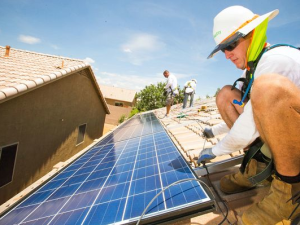by AMANDA H. MILLER, CleanEnergyAuthority, May 6, 2014

Solar in Arizona
Photo: Arizona Republic
Source: www.cleanenergyauthority.com
Homeowners who are leasing rooftop solar arrays in Arizona could be hit with an average $152 a year property tax bill they weren’t counting on when they decide to go solar.
The state department of revenue recently reinterpreted a tax policy that exempts rooftop solar equipment from property tax, determining that the exemption only applies to those who own their solar arrays, not people who lease solar panels.
The state Department of Revenue said the leased panels are merchant power plants and the leasing companies should pay tax on them.
Those taxes would flow through to customers.
Solar leasing accounts for the majority of the distributed solar generation in Arizona and is widely adopted by middle class residents who can’t afford to buy complete systems outright.
Most who lease rooftop solar systems save $60 to $120 a year over buying all of their power from Arizona Public Service. The new property tax would erase the cost benefit of going solar, solar advocates say.
“Arizona is breaking new ground for being an extremely strange political environment,” said Bryan Miller, vice president of public policy for solar leasing company Sunrun and president of The Alliance for Solar Choice.
The state is notoriously anti-tax and even has a provision in its law stating that if a law or tax code is ambiguous it must be construed in favor of no tax.
“You would think that law came from Arizona,” Miller said. “And it does.”
That’s why it’s so strange the tax exemption was reinterpreted in the first place. Solar advocates have accused utility Arizona Public Service of pushing it, something APS repeatedly denied, claiming a neutral position on the topic.
But Barbara Lockwood, general manager of regulatory policy for APS, wrote a letter to regulators last week in support of the tax.
“This is a utility that has run amok abusing the public trust,” Miller said. “They’re serial liars.”
This is the second controversy surrounding Arizona rooftop solar and APS in as many years. The state Corporations Commission voted in 2013 to impose an average $5 a month surcharge on rooftop solar customers rather than the $50 to $150 charge Arizona Public Service requested.
The solar industry considered the decision a win because the commission seemed to have responded to proof that APS used dark money to fund a fake nonprofit to fight rooftop solar, something the utility repeatedly denied doing until media revealed connections.
“Utilities are put in the unique position of having no competition,” Miller said. “And in return, they owe a duty of maintaining the public trust.”
When utilities break that trust, they threaten their unique position in the market, Miller said.
Hawaiian regulators offered a shining example this week of what can happen to a utility that abuses the public trust, Miller said. They rejected Hawaii Electric Companies’ integrated resource plan this week and recently cut the rate of return for one of the utility’s subsidiaries.
In Arizona, the Bank of America downgraded APS’ credit rating because of the recent damage to its relationship with ratepayers and regulators.
The new property tax on leased solar will begin coming due in October 2015 if the department of revenue doesn’t reconsider. Sean Laux, legislative liaison for the department told the Arizona Republic that’s unlikely unless new information comes to light.
Miller said Gov. Jan Brewer has authority over the department and the power to stop the tax. The self-proclaimed “Queen of Solar” will have to act if she doesn’t want to contend with throngs of angry constituents, Miller said.
“She should do it today,” Miller said. “She shouldn’t wait for anything.”